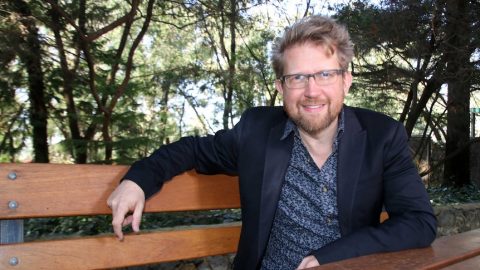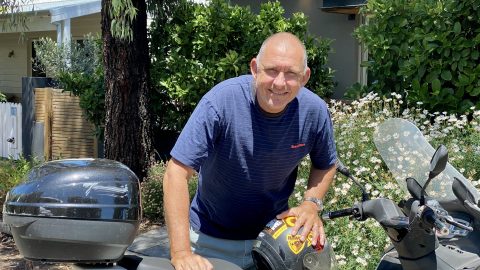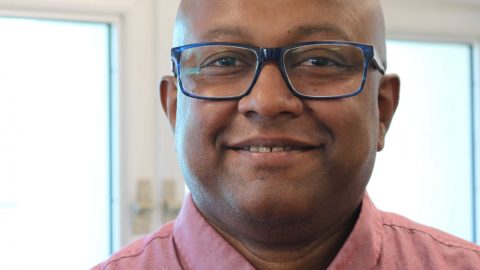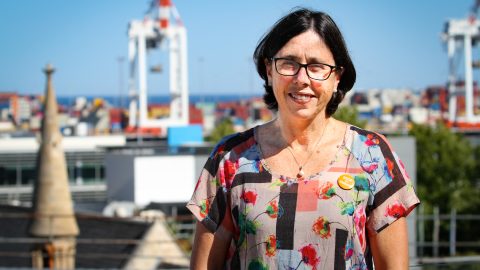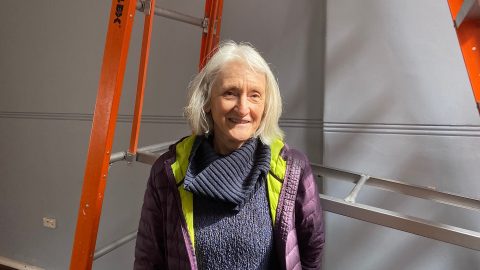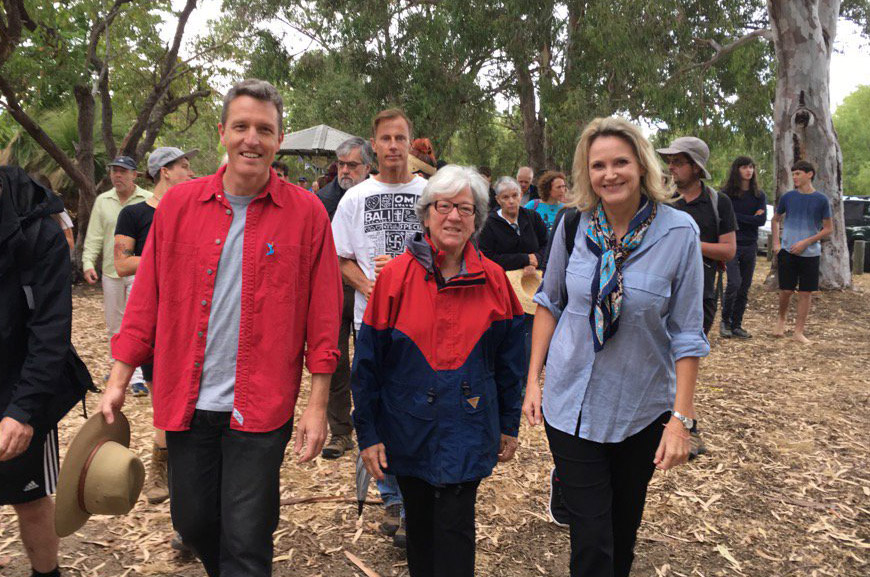Eric Abraham Silbert was born in the front room of his parents’ newly constructed Federation style home in Ellen Street, Fremantle on 2 July 1922.
He was the second child of Minnie née Masel and Barney Silbert who had built their new home in 1920, after marrying in 1913. It was the only home Eric had known when he enlisted to serve in World War 2 in 1940.

The Ellen Street home built by Minnie and Barney
He loved the house, having a bedroom on the verandah, and being opposite the huge expanse of Fremantle Park. As a very young child he managed to end up amongst a flock of agisted sheep on the Park!
He was able to walk to school in minutes with Christian Brothers College, Fremantle being virtually next door.
For secondary school, his parents decided he should board at the newly built CBC in the bushland at Salter Point on the Swan River. Today it is Aquinas College. Barney and Minnie believed Eric might study harder if a boarder.
Eric enjoyed school life as a boarder and felt the day boys were hardly there! Again, his boarder’s bedroom was on a verandah and he continued his lifelong love of sport.
Indeed, recently Aquinas honoured Eric at the campus in an alumni program involving a website and large posters around the school grounds.
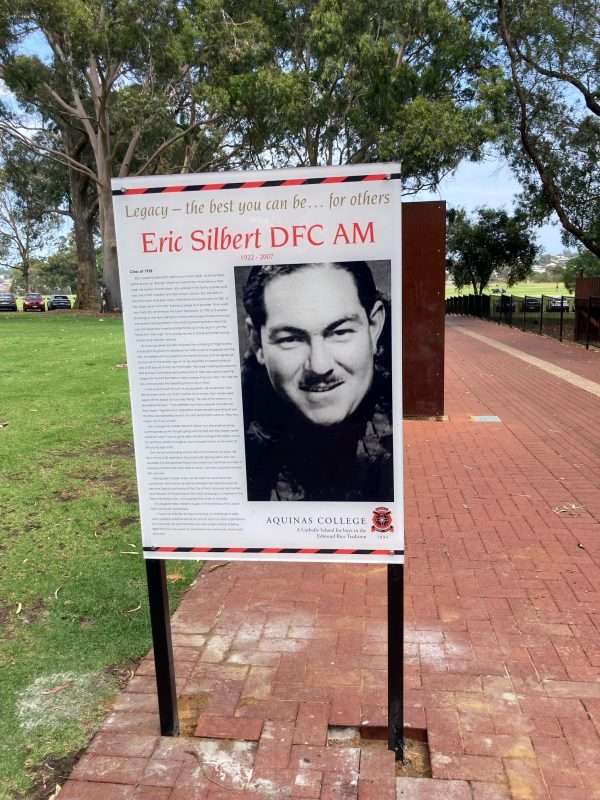
Recognition at Aquinas College
His boarding school experience was an excellent introduction to his later wartime life in the Air Force. On leaving school, however, he worked at Barney Silbert’s Shoe Store in Fremantle, and gained his driver’s licence and some sartorial splendour.
In Eric’s words “It was a smart young businessman who commenced work in his new three-piece navy suit and felt hat. This was the essential dress of anyone engaged in commercial enterprise…this was the minimum standard of appearance after school uniform. I had a new image with a white two-collar fashion shirt; colours were not even available … and twenty-two inch cuff bottom trousers really identified me as a young retailer.”
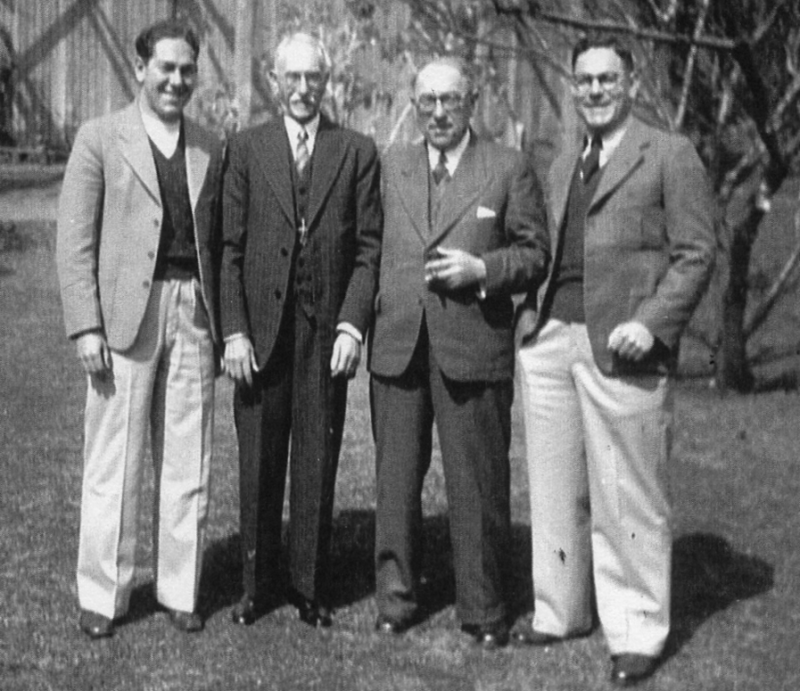
L-R Eric, grandfather Joseph, father Barney, brother Keith
Three generations of Silberts
As soon as he was 18 he signed up for the Air Force. The war had broken out the year before, in 1939. He trained in Western Australia, then the Eastern States, with the RAAF – the Royal Australian Air Force – before arriving in the UK as part of the RAF – the Royal Air Force. He always believed the training and leadership experiences of this period of his life was his tertiary training. He loved the friendships and team building that actually were matters of life and death. The living conditions would have related well to his boarding school experiences.
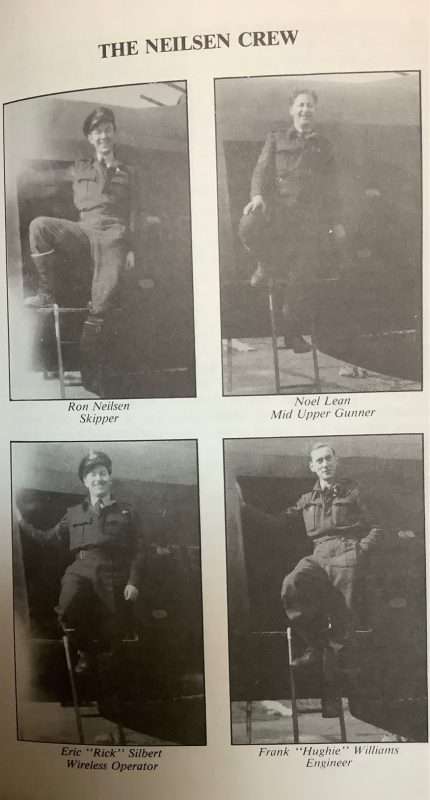
He was one of the lucky ones: he returned home aged 23, having been a Pathfinder with a crew flying a Lancaster bomber spotting targets for the planes that followed. He ended up with a bunch of medals including the DFC – the Distinguished Flying Cross. A tribute to a school friend who did not return, was the naming his first born, Kevin. An historic moment Eric was honoured to be a part of before he returned home, was attending the memorial service for Prime Minister John Curtin at Westminster Abbey in London.
One of the anecdotes about Eric on his return to Perth from years with the RAF in the UK, and still to be demobbed, involved him and a friend on the street in Perth in uniform when they came by a newspaper boy singing out, ‘Here’s the news, read all about it!’. Young Eric responded, ‘We don’t buy the news, son. We are the news!’
Eric’s return to his home State saw him also returning to work in Barney Silbert’s Shoe Stores which by then had expanded to include two more shops in Fremantle – and to playing several sports. He was an early squash player, and returned to rugby where club meetings were held at the store. He had enjoyed playing rugby at school and while in the Air Force.
In terms of community involvement, Eric covered a breadth of organisations: he was involved with Freemasons as the first initiate admitted into Ad Astra Lodge no. 237 in February 1948. This was the newly formed Air Force Lodge and he went on be Master Mason. He was a foundation member of Fremantle Apex and became President in 1951. Other organisations he participated in were Fremantle Rotary, the Fremantle Branch of the Liberal Party and on the Winston Churchill Memorial Trust, Fremantle District.
Unbeknown to Eric, when he returned from active service, he was not aware that his parents no longer lived in the only home he knew. It seems during the War, the Silberts’ Ellen Street home became home to the US Navy and Barney and Minnie moved to Nedlands.
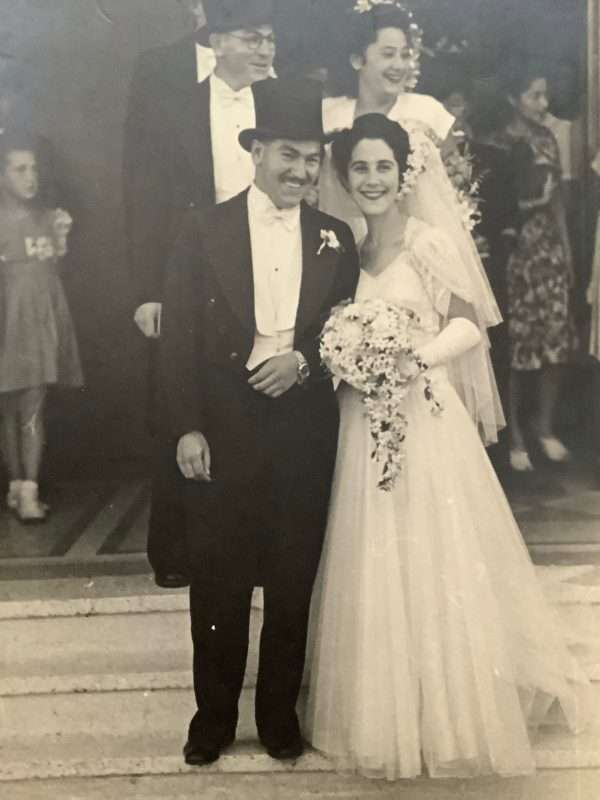
Wedding Photo – Eric Silbert & Joan Tate
By the age of 25 Eric had married the girl next door. Not strictly true: her cousins lived in Ellen Street. The bride was Joan Tate, daughter of Rachel and Lionel Tate, sister of John Tate. They married on 11 February 1947, he complete with top hat and tails in 40 degree heat. War restrictions were not over so the bridal veil was borrowed. One month later the newly marrieds attended Eric’s DFC Investiture Ceremony at Government House officiated by Lieutenant Governor Sir James Mitchell.
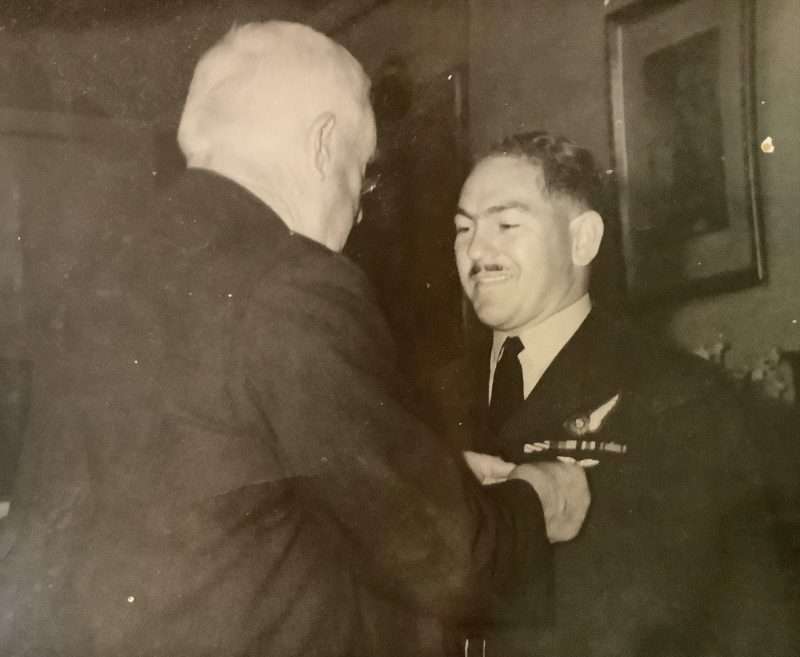
Investiture of DFC by Lieutenant Governor Sir James Mitchell
Like his father Barney, Eric was a people person and was very interested in the store’s staff and their families. What was quite quirky was the office the two brothers – Keith amd Eric – shared when managing the High and Market Street store. It was up a steep staircase on a mezzanine level. As a child I remember visiting to be fitted for shoes and my father walking me around the corner of Market Street for ice cream from an Italian shop. This was the future Benny’s, but back then ice cream only consisted of vanilla in a cone – no fancy options!
Dad’s work in Fremantle meant every Friday night, he brought home fresh dhufish wrapped in white paper for Mum to cook beautifully. Yum. He also ate at the Boronia Tea Rooms every day at 1pm!
One thing my Father deeply valued, from every stage of his life, were friendships. Some of his wonderful friends were Bob Higham, Bill Dermer, Hugh Mellor, Syd Ryan, Chilla Porter, Norm Souter, Hugh Scott, Bert England, Bob Walker, Ron Warren, Jim Mazza, Gordon Westlake, Ron Lane, Ross Hutchinson.
His time at Barney Silbert’s Shoe Store was a time when many students were employed during high school, university studies, and even when training for the priesthood. Father Brian Gore started at Barney’s when he was in the old sub-leaving (year 11) and continued through his seminary studies. Eric and Joan were honoured to be the only non Catholics at his ordination. They stayed in touch and Eric was one of the people who tried to assist Father Gore when he was arrested whilst serving in the Phillipines.
Eric continued to be involved in many community organisations. He was President of the Pathfinders Association, WA. He was a Founder, President and Life Member of Temple David Synagogue. When his children needed a local kindergarten, he and other parents built one and he became the first President of the P&F. When the children went on to primary and high school he was again President of the P&F. He was invited to be Patron of the Hodgkin’s Disease Association; a warden to the War Memorial in King’s Park; became a Justice of the Peace; a Government appointee to the Senate of the University of Western Australia 1975-86; awarded an AM, Member of Order of Australia in January 1979; and was also Chair of the Order of Australia 1987/88.
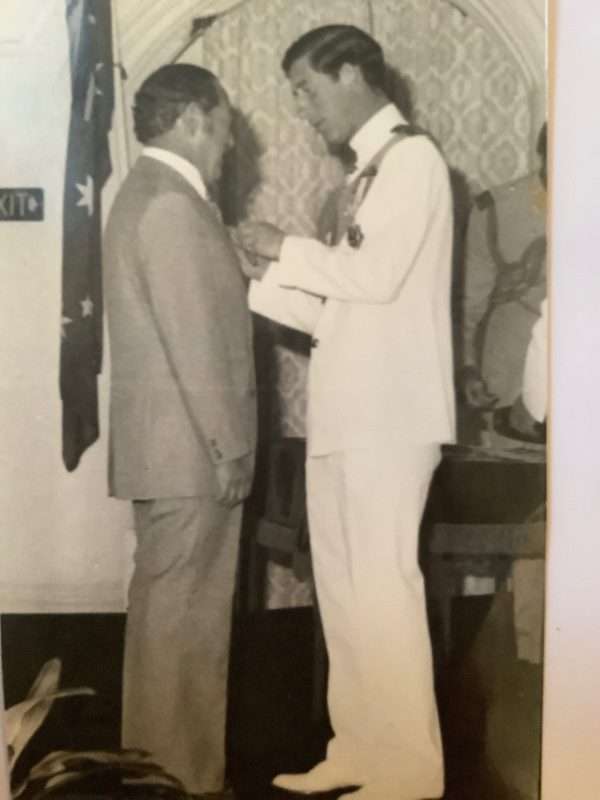
Presentation of AM – Member of Order of Australia by Prince Charles 1979
A family business arrangement with cousins Cecil and Alec Breckler lead to the 1969 merger of Barney Silbert’s Shoe Stores with Betts and Betts and Cecil Brothers. The High and Market Street shop was the most successful in the group.
This change in focus saw him stand for election as a City of Perth councillor. He was told he would never be elected first attempt – but he was! He represented the West Perth ward from 1973 to 1990 and was Deputy Lord Mayor in 1978/9.
One incident while Eric was a councillor linked him back to his War experience. It involved a visit to Council House by a Dutch delegation. Eric regularly attended these civic occasions. He was talking to a very tall, younger Dutchman who asked him if he had ever been to Holland. Eric replied that his only visit was at the end of the War when he and his fellow Lancaster crew were flying in much needed food. Eric described how they did not know any Dutch so wrote ‘Guten Morgen’ on the underbelly of the Lancaster and landed on a school oval. At this point, the visitor became quite emotional and told Eric he was one of the children on the oval that day, and now had the chance to thank him.
Joan and Eric had four children and Eric was involved in all they did: he crewed for Kevin on his VJ and catamaran; he was an athletic official for Hilary at Perry Lakes Stadium and both would be regularly dobbed in as a driver for the range of the children’s activities.
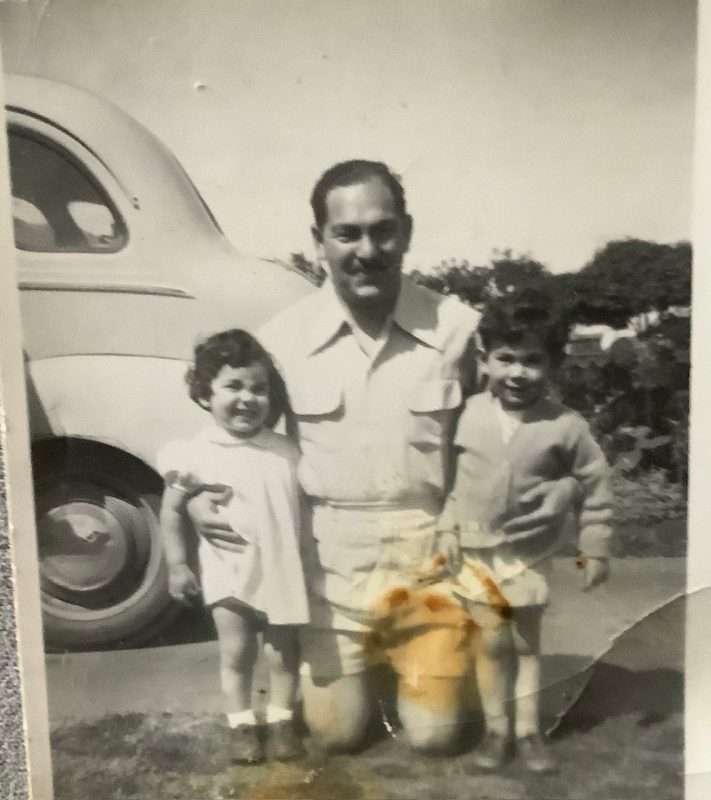
Young father with first two children Kevin and Hilary
The home Joan and Eric built for the family reflected their strong views of the type of construction suitable to our climate. It was an incredible design ahead of its time: light and bright, facing north, solar hot water, large cellar, indoor plants in the 1960s, gallery kitchen, pantry, flat roof, terraces, beautiful timbers. It still stands today. Every weekend Eric played music on the record player with a speaker on an extra long lead outside the house. As a result we children knew every word of every song of all the musicals of the time!
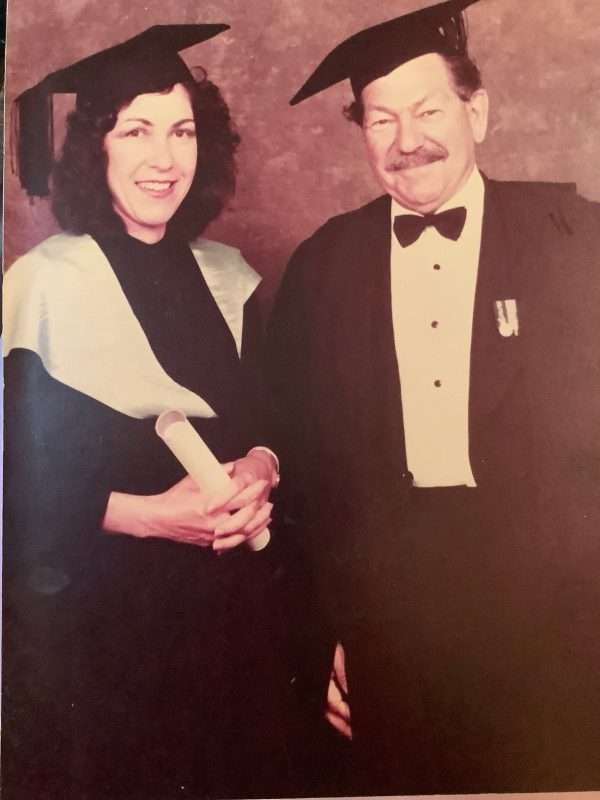
Daughter Hilary’s graduation ceremony with Eric, member of Senate UWA
The kids made Dad tea on the weekend while he pottered around the house. The rule was to have it topped with boiling water, as we handed it to him. I believe this was a hangover from the War and cold tea.
His experience in the RAF gave him a long term love affair with all things British: their humour, culture, ceremony and protocol, which he passed on. British TV was a part of our childhood. All in a family with no British background. He was always early for appointments which was in complete contrast to our Mother’s habit of always being late.
In 1971, Eric came home after an historic encounter with the Russian Ambassador who was visiting Perth. At the time there was the plea ”Let my people go” for Jewish people living in Russia who were discriminated against. In order to deliver the message to Ambassador Nicolai Mesiatsev, Eric devised a plan to print fake theatre programs containing this message and, working with university students, deliver the ‘program’ to the Governor and the Ambassador at His Majesty’s Theatre. Mission accomplished.
When he returned home from the theatre my sister Stephanie said to him that he had lived a remarkable life, so he should write about it. Dad replied he couldn’t write, so she told him to make a recording. He did, and a friend typed up the manuscript. Thus his autobiography entitled Dinkum Mishpochah was born. The title reflected his Australian and Jewish identity and was only meant as a letter to his children. It is in three sections and the middle third is a detailed account of his experience in the War and as a Pathfinder. It is often quoted in other books on the topic and also gave our family a glimpse of relatives and experiences. Ten years in the making, it was published in 1981.
Eric did not join the RSL or talk about his experiences in the War for decades. I learnt much when hearing an interview with a university student. He told them that anyone who said they weren’t scared was lying. He also believed that the greatest pacifists are those who have seen war. What was such a revelation to me was to hear him say that he resolved, if he lived, he would serve the community. I thought he was just being a normal dad, not one that had such a track record with organisations and volunteering.
One amusing part of serving the community was in his role as a Justice of the Peace. By then he lived in a high rise apartment in Perth and as a JP could be called at any time of the day or night, and often was. ‘I wonder what the neighbours thought’, crossed his mind one night as he was escorted into the lift by two tall policemen in the middle of the night to deal with yet another matter.
Eric always maintained an affinity with Fremantle. In the 1980s when The Old Synagogue complex in Fremantle housed a cafe and the boutique ‘Skid Rose’, the owner Rory asked Eric to design the replacement stained glass windows. They’re still visible today if you walk into Tonic and Ginger. Some think they are the original!
In 1992 Eric turned 70. He never wanted a party for any birthday so he was in for a surprise – a family picnic on Monument Hill. But first plans were made to include a stop at his parents’ old home at 55 Ellen Street. The owner warmly welcomed the family. Eric had not been in it since he was eighteen and the owners wanted to hear his stories about that time and share their plans for the home for the future.
One memento of Barney Silbert’s Shoe Store at the corner of High and Market Streets, Fremantle remains proudly in my house. When my father saw bookshelves being built either side of a fireplace at my home he suggested the Barney’s ladder, that was used to access the shoes higher up, would be perfect in my high ceiling study. And it was!
I have no doubt my father’s World War 2 experience as a RAF Pathfinder, one of those sent ahead in the dark to locate and mark target areas, significantly influenced him for the rest of his life. For me, he truly was a person who discovered or showed others the way ahead.
Eric Silbert AM died 22 December 2007.
* By Hilary Silbert
Hilary is the Granddaughter of Minnie and Barney Silbert and daughter of Eric Silbert
~ If you’d like to COMMENT on this or any of our stories, don’t hesitate to email our Editor.
~ WHILE YOU’RE HERE –
PLEASE HELP US TO GROW FREMANTLE SHIPPING NEWS
FSN is a reader-supported, volunteer-assisted online magazine all about Fremantle. Thanks for helping to keep FSN keeping on!
~ Don’t forget to SUBSCRIBE to receive your free copy of The Weekly Edition of the Shipping News each Friday!
